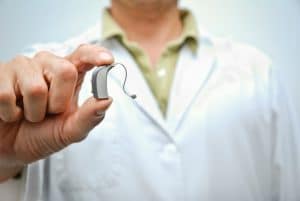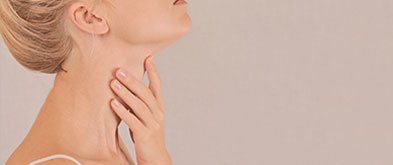Choosing the Right Hearing Aid for You
 Why Would Someone Need a Hearing Aid?
Why Would Someone Need a Hearing Aid?
The Hearing Loss Association of America (HLAA) estimates about 48 million Americans, roughly 20% of the country’s population, suffer from some degree of hearing loss. There are three main types of hearing loss: conductive, sensorineural, and mixed. For the sake of this article we will focus on the most common type that is treated with hearing aids which is a sensorineural loss. Sensorineural hearing loss essentially means permanent hearing loss at the level of the auditory nerve and can be due to noise exposure, aging, genetics, exposure to ototoxic drugs as well as other factors.
While the hearing loss itself is usually irreversible, hearing aids can assist in augmenting your residual hearing by minimizing background noise and bringing speech forward in difficult environments and situations. Hearing aid users have reported less fatigue at the end of the day from having to use less effort to join in conversation and socialize and thus, improving their quality of life. Modern hearing devices are sleek and compact in appearance and are digital with fast processing computer chips that are programmable to an individual’s hearing levels and are personalized to hearing preferences. Hearing devices have the capability of improving the hearing abilities of anyone with a mild up to a profound hearing loss.
Different Styles of Hearing Aids
The vast majority of hearing aids on the market today are digital. Digital components allow for a more sensitive and personalized listening experience as well as connectivity to our phones, computers and other accessories.
Common types of hearing aid styles include:
Receiver in the Canal (RIC)
This style of hearing aid is comfortable and barely visible. They are an excellent choice for individuals with mild to severe hearing loss.
Traditional Behind the Ear (BTE)
BTEs offer higher levels of amplification. They are great for those with severe to profound hearing losses and dexterity issues.
Completely in Canal (CIC)
CIC hearing aids have low visibility and are custom made devices.
In the Canal (ITC)
This low-visibility device sits in the ear canal and is a custom made device.
In the Ear (ITE)
ITEs are easy to insert and are custom made devices. This style is a great option for individuals with poor mobility in their hands and those who do not want something over their ears.
The style of hearing aid that is recommended for an individual is dependent on their hearing loss, lifestyle, ear anatomy, dexterity, and cosmetic preference. All these factors must be taken into account and discussed with your audiologist in order for the patient to have the most natural and effective listening experience with hearing aids.
Symptoms That You May Have a Hearing Loss
Consider seeing an audiologist for a professional hearing diagnosis if:
- You find yourself constantly asking others to repeat themselves
- You are needing to turn up the television or use subtitles to understand what is said
- You have difficulty with phone conversations (others seem to “mumble.”)
- You struggle to make conversation in crowded places like a restaurant
- You are mentally exhausted at the end of the day from using so much effort to listen
Age is the biggest risk factor for hearing loss – more than 50% of Americans with hearing loss are over 60 years old. However, hearing loss can occur in individuals of all ages.
Who Is a Good Candidate for Hearing Aids?
Most people with a hearing loss can benefit from the use of a hearing device. Ask your audiologist and Ear, Nose and Throat physician (ENT) if they are a good option for you.
Being Proactive about Your Hearing Health
There are many different reasons why hearing loss occurs and while some are inevitable there are ways to be proactive about your hearing health. Getting annual hearing evaluations can help identify beginning stages of hearing loss and thus stop or minimize behaviors that could be detrimental to your hearing long term. Once a hearing loss has been identified, monitoring it for changes is important. Dramatic or sudden changes in hearing call for medical attention that has the potential to salvage hearing that would otherwise be permanently lost.
Exposure to noise is known to cause hearing loss, however, what many fail to realize is that the length of exposure to noise matters just as much as the loudness or type of noise. For example, continuous exposure to moderately loud sounds such as a loud working environment can cause just as much hearing loss as a sudden, extremely loud sound like a gunshot or explosion. Wearing hearing protection at all times when participating in activities that will be in loud environments is recommended to minimize the side effects. Custom hearing protection is available if commercial products do not fit your needs or they are not a good fit for your ear anatomy. If you are unsure of what kind of hearing protection to use for the type of activity you will be participating in, speak to your audiologist.
While not all hearing loss requires the use of hearing aids, it is best to have any hearing loss medically evaluated. Sudden hearing losses, ringing in the ears, imbalances in hearing between the ears, feelings of fullness or fluid in the ear are common symptoms of hearing losses that have the potential to be medically treatable. Occlusion of the ear canals with wax is a common occurrence that can cause the sensation of hearing loss and can be easily remedied by having your ENT clear out the canals. It is not recommended you insert objects into the ear canals, such as cotton swabs, to attempt to extrude the wax as you may push it in further and damage ear structures. If you are experiencing any of the above symptoms it is recommended you schedule an appointment with your ENT as soon as possible. Waiting to receive medical treatment can make situations worse. Prompt treatment results in healthier ears.
For personalized hearing health and hearing aid advice, contact Lakeside Allergy ENT and schedule an appointment today.

 Why Would Someone Need a Hearing Aid?
Why Would Someone Need a Hearing Aid?




